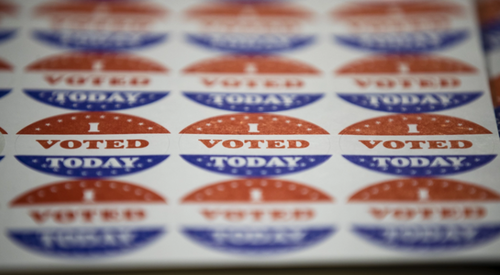High Stakes In Pennsylvania’s Primary Races
Authored by David Thornburgh via RealClear Politics,
Pennsylvania, where deep-blue and deep-red politics collide, is in the midst of an unprecedented primary election season. The May primary is the first one in the Commonwealth’s 235-year history in which voters – except registered Independents – will have the chance to vote for candidates in open gubernatorial and U.S. Senate races, new state House and Senate districts, and new congressional districts.

In the marquee races for Senate and governor, both major parties are struggling to nominate candidates who can not only make it through the paddlewheel of the primary, but also win in the general election – especially in a state that typically plays politics between the 40-yard lines.
At last count, the Republicans have nine candidates for governor crowding the debate stage – unheard of for the normally disciplined Pennsylvania GOP. And, as in other states, the specter of the 2020 elections continues to haunt the field. One of the leading gubernatorial candidates, south-central Pennsylvania state Sen. Doug Mastriano, is a January 6th participant who has actively campaigned against his own party in the run-up to the primary. Mastriano and the other eight candidates in the GOP field all do their best to court former President Donald Trump’s endorsement.
On the Senate side, the front-runners appear to be two recent transplants: celebrity doctor Mehmet Oz, a long-time New Jersey resident, and hedge fund CEO Dave McCormick, who relocated to Pittsburgh after living in Connecticut. They’ve settled into their own version of political trench warfare, lobbing expensive and incendiary television ads at each other. Meanwhile, former Trump ambassador to Denmark Carla Sands, who previously lived in California, adds her own occasional salvoes. Together, the GOP Senate candidates and their affiliated independent-expenditure groups are said to be on track to spend $100 million on television spots alone during the primary.
At first glance, the GOP appears to be the party of chaos and disarray, while Democrats seem to have order and discipline. But this isn’t necessarily the case. Though Attorney General Josh Shapiro is running unopposed in the gubernatorial primary, the Senate race remains a battle between the party’s progressive and moderate wings. Lt. Gov. John Fetterman, a progressive reminiscent of former Minnesota governor Jesse Ventura, faces establishment favorite Conor Lamb, a western Pennsylvania congressman, and progressive Philadelphia state Rep. Malcolm Kenyatta.
Both parties are trying to thread the needle in appealing to their vocal and energized political bases while maintaining enough broad appeal to win a general election. The nightmare scenario for both parties is that their populist candidates emerge victorious from the primaries, leaving a real challenge for the general election.
A recent Emerson College poll confirmed the parties’ problems. The most anti-establishment candidates – Oz and Fetterman in the Senate primaries, and Mastriano in the GOP gubernatorial primary – all led the poll.
Adding to the challenge is the fact that primary turnout will likely not break the low twenties. Primary turnout in the 2018 midterm election reached only 18%, one point higher than in 2014. Further compounding the problem is the fact that Pennsylvania – unlike 41 other states – excludes 1.1 million independent voters from voting for candidates in primary elections.
I chair a new effort called Ballot PA – an initiative of the Committee of Seventy, a venerable good-government group – that aims to open the primary door to independent voters, the fastest-growing segment of Pennsylvania’s electorate. The Ballot PA proposal, which would allow independents to pick a party primary in which to participate, has strong public support and numerous legislative champions, but even if it passes, it won’t affect the 2022 primary.
In Pennsylvania in 2022, Republicans and Democrats – but not independent voters, at least for a little longer – will weigh in on some of the most important elections in the country. The state’s gubernatorial winner will become the leader of the 18th-largest economy in the world. Pennsylvania voters could also decide control of the U.S. Senate or the House. If there’s any year the Keystone State has really earned its nickname, 2022 is it.
https://ift.tt/aDjyzX3
from ZeroHedge News https://ift.tt/aDjyzX3
via IFTTT




0 comments
Post a Comment